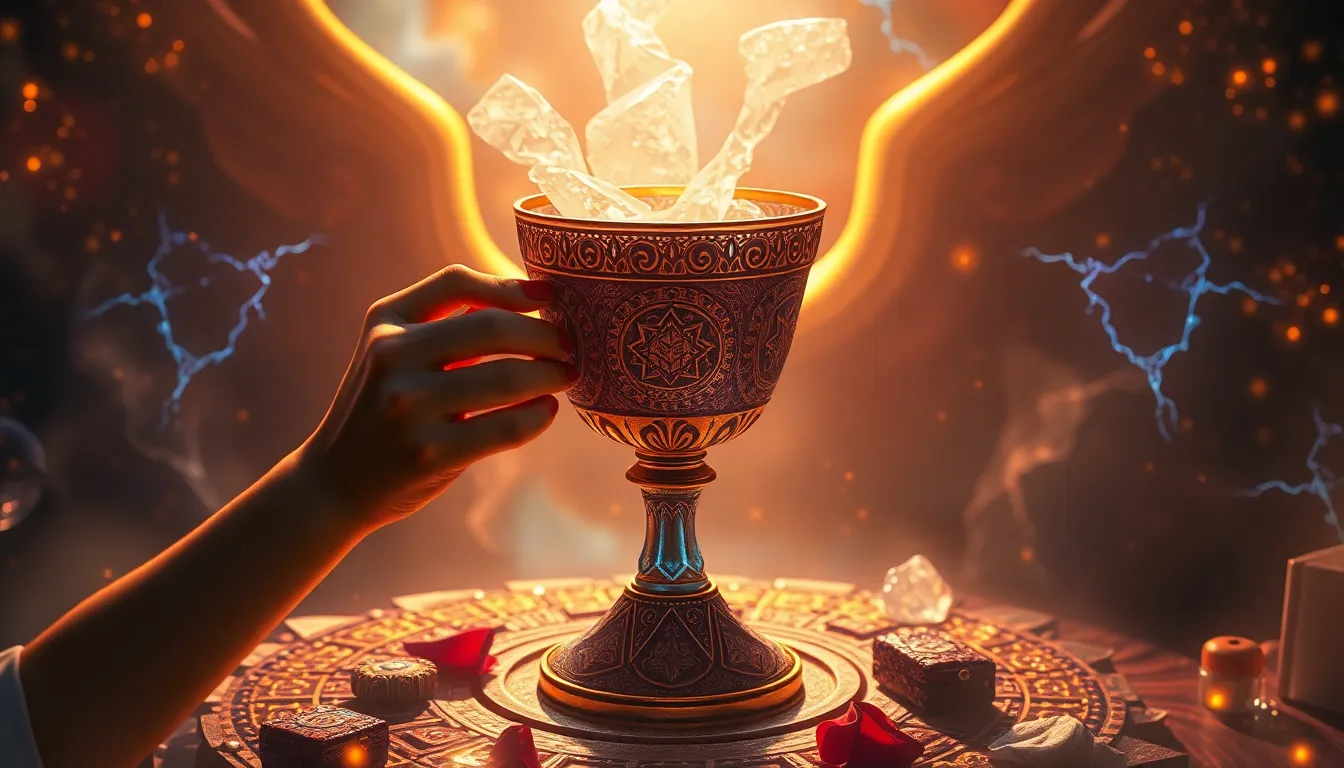The Crystal Chalice: Drinking from the Cup of the Gods
1. Introduction: The Allure of the Crystal Chalice
The crystal chalice, a vessel of both beauty and significance, has captured the imagination of humanity for centuries. Defined as a drinking cup made from crystal or glass, these chalices have historical significance that transcends mere utility. They are often associated with divine beings, symbolizing purity, enlightenment, and the sacredness of the act of drinking. From ancient rituals to modern spiritual practices, the allure of the crystal chalice lies in its ability to connect the mundane with the divine.
2. A Brief History of Chalices in Human Civilization
The origins of drinking vessels can be traced back to ancient societies where functionality met artistry. As cultures evolved, so too did the designs and materials used in chalice-making:
- Ancient Societies: The earliest chalices were often made from clay or wood, designed for practical use.
- Evolution of Design: With advancements in metallurgy and glass-making, chalices began to be crafted from precious metals and crystal, showcasing intricate designs and artistry.
- Notable Chalices: Throughout history, notable chalices such as the Chalice of Saint Martin and the ornate goblets of the Renaissance period have held significant cultural and religious importance.
3. Mythology and Symbolism: The Chalice in Religious Texts
Chalices play a pivotal role in various religious practices, serving as symbols of divinity and communion. Different traditions interpret the chalice in unique ways:
- Christianity: The Holy Grail is perhaps the most famous chalice, representing the cup used by Jesus during the Last Supper, symbolizing sacrifice and eternal life.
- Paganism: In many pagan traditions, chalices are used in rituals to represent the goddess and the feminine divine.
Chalices often symbolize:
- Divinity
- Sacrifice
- Communion with the divine
4. The Crystal Chalice in Art and Literature
The beauty and mystery of crystal chalices have inspired countless artists and writers throughout the ages. In art, crystal chalices are often depicted as symbols of abundance and purity. Notable examples include:
- Renaissance paintings featuring chalices in religious contexts.
- Modern art installations that utilize chalices to explore themes of spirituality.
In literature, chalices serve as potent metaphors for aspiration and enlightenment, representing the quest for knowledge and the pursuit of the divine. Works such as Arthurian legends and contemporary fantasy novels often feature chalices as central elements in their narratives.
5. Cultural Variations: Chalices Around the World
Chalice traditions vary widely across cultures, each infusing their unique styles and materials into the art of chalice-making. Some notable cultural variations include:
- Persian Chalices: Often intricately designed with geometric patterns and vibrant colors, reflecting the rich history of Persian art.
- Celtic Chalices: Frequently made from wood or stone, these chalices are associated with nature and the earth.
Chalices also play significant roles in various rituals and ceremonies, from weddings to harvest festivals, emphasizing their importance in communal gatherings and spiritual practices.
6. Craftsmanship and the Art of Chalice Making
The art of chalice making is a time-honored tradition that requires skill and dedication. Craftsmanship involves various techniques and materials:
- Materials: Skilled artisans often use crystal, glass, wood, and metal to create stunning chalices.
- Techniques: Techniques such as glass blowing, engraving, and gilding are employed to enhance the aesthetic and functional qualities of chalices.
Interviews with artisans reveal the passion and commitment involved in maintaining the cultural heritage of chalice-making, as each piece tells a story of art, spirituality, and community.
7. The Mystical Properties of Crystal
Many believe that crystal chalices possess mystical properties that enhance spiritual practices. The metaphysical attributes attributed to different crystals include:
- Amethyst: Known for its calming energy and ability to promote spiritual growth.
- Rose Quartz: Associated with love and emotional healing, often used in rituals for compassion.
These properties are thought to enhance rituals and ceremonies, creating a sacred space that fosters connection with the divine.
8. Modern Interpretations: Chalices in Contemporary Society
In recent years, there has been a resurgence of interest in crystal chalices within modern spirituality. People are increasingly incorporating chalices into their rituals, celebrations, and gatherings:
- Spiritual Practices: Many use chalices during meditation and intention-setting ceremonies.
- Mindfulness: The act of drinking from a chalice can promote mindfulness and a sense of connection to the present moment.
9. Caring for Your Crystal Chalice: Maintenance and Practices
To preserve the beauty and integrity of your crystal chalice, proper care is essential. Consider these best practices:
- Cleaning: Use a soft cloth and mild soap to gently clean your chalice, avoiding harsh chemicals.
- Rituals: Regularly energize and consecrate your chalice by placing it in sunlight or moonlight, allowing it to absorb the natural energies.
- Spiritual Practices: Incorporate your chalice into personal spiritual practices by using it during meditation or as a focal point in rituals.



